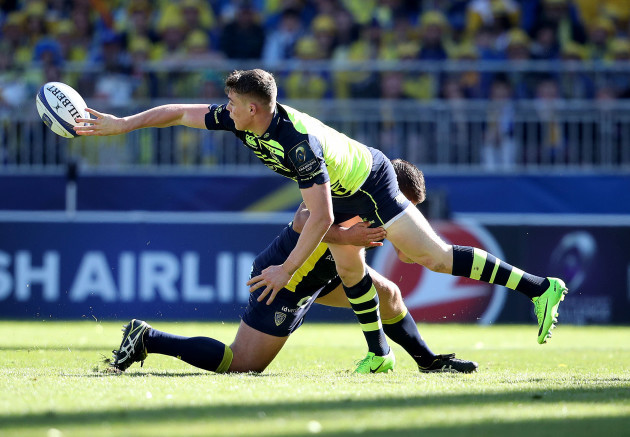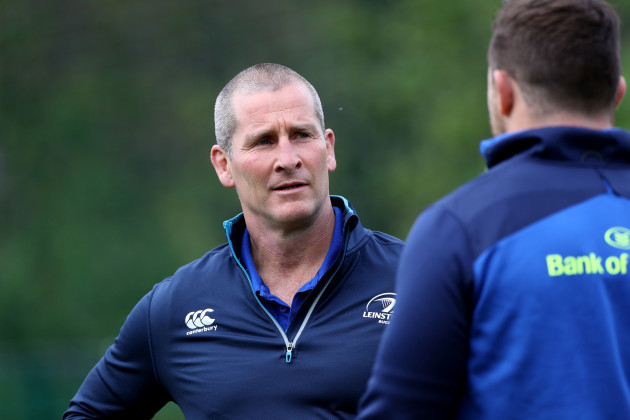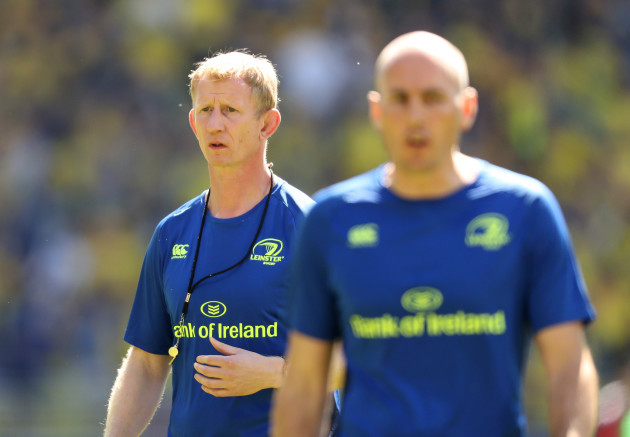THERE’S BEEN A strong vibe of New Zealand rugby around Leinster this season.
Their 1-3-3-1 shape in attack is something many sides on the other side of the world use, they have embraced risk-taking with their frequent offloads, and they continue to improve their attacking kicking game.
The free-spirited nature of their best performances in this campaign has been thrilling for the province’s supporters, who have always craved this brand of rugby.
Leinster didn’t go into their shells in the knock-out stages of the Champions Cup, though they did damage their chances in the semi-final with a disastrous start, and head coach Leo Cullen doesn’t see anything changing for their Pro12 semi-final against the Scarlets on 19 May.
This is Leinster’s modus operandi, and it feels right.
“It’s a little bit a part of our DNA at Leinster,” says Cullen. We want to be a team that plays. With that comes some risks at times, so you’ve got to take that.
“We’ve just got to make sure that we manage the game sensibly. It is a knock-out game.
“The Clermont game was slightly different because of the fact that we obviously had to chase the game and there was a lot of really good things.
“Garry [Ringrose]‘s try came from us playing from deep, it was an amazing bit of individual brilliance where he takes the line on and has the pace and skill to get to the try line.
“Yeah, we’ve got players who are very ambitious. When we play at home in particular, the players want to produce special moments that make people want to come up and support them.”
Stuart Lancaster has been credited with the revival of Leinster’s attacking game, with players singing his praises since he arrived as senior coach this season.
The former England head coach is a huge admirer of New Zealand rugby and has studied their methods and tactical approaches in depth, as well as working with Mitre 10 Cup side Counties Manukau last year.
So while he was initially in charge of Leinster’s defence after the departure of Kurt McQuilkin, the Englishman has assumed control of coaching the province’s attack too.
“Some of the experiences that Stuart has had, definitely… he came in to replace Kurt but talking to Stuart at the time there was a lot of areas that we felt we needed to add to our attack, definitely,” says Cullen.
“We played in a lot of better conditions, which meant that we scored a lot more tries but also that we conceded a lot more tries than we did last year.
It’s a balance. Young lads come in and they’ve definitely got a lot of confidence. It’s that sort of fine balance between naivety or bravery.
“It’s always trying to get that balance. It’s exciting, but if you score 10 tries from deep you’re going to run the risk of maybe turning the ball over deep inside your own half, where you get punished.
“So it’s definitely that fine balance and as you get towards these kind of games we have to make sure we control how we manage that. But it has been a learning process, the way we play.”
And while Lancaster has undoubtedly been essential in implementing Leinster’s attacking ideas and methods, this is the way Cullen wanted things to go.
He spent time in New Zealand in the latter stages of his playing career, visiting Super Rugby sides and learning from coaches like Dave Rennie and Wayne Smith.
The arrival of World Cup-winning coach Graham Henry at the start of this season was also influential on Cullen, even if the great Kiwi’s stay was only short-term.
“I spent a bit of time with the Chiefs and with the Crusaders, watching the way they play, and the Crusaders very much had a blueprint of the way they played and they’ve kept that through the Canterbury team as well,” says Cullen.
“But you’re trying to evolve and you’re looking to learn from the best teams, and that’s not just New Zealand but England over the course of the year, seeing what they’re doing and having a real good look at that.
“Stuart would know the players well, and we look at not just what Eddie Jones has brought in, but what are Ireland doing. So all the time you’re trying to learn from the best teams.
“You’re trying to pick up things as you go, even from the players coming back from camp. You’re curious to see or to hear what they’ve picked up from the Six Nations and from the teams they’ve come up against, and where they’ve come unstuck, and what’s gone well.
“We want to have our own identity in the way we do that, but we’ve evolved the different sections – we break up the game into different sections and we’ve got players that take control of those different sections of the team.
“It’s important that we’re always evolving slightly but go back to say, ‘Ok, this is what we actually want to do’, not completely abandoning what we want to do.”
The42 is on Instagram! Tap the button below on your phone to follow us!



